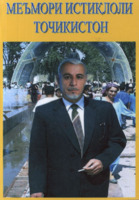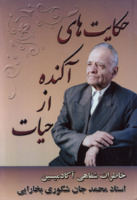Browse Documents (2 total)
Меъмори истиқлоли Тоҷикистон Architect of Tajikistan's Independence
From the publisher: Хонандаи гиромӣ, китобе, ки дар даст дорӣ, маҷмӯаест, аз навиштаҳои донишмандон ва журналистони шинохтаи кишвар аз рӯзгор ва пайкори шахсияти мубориз ва донишманду маорифпарвари машҳур Тоҳири Абдуцаббор, ки ба ҳангоми беморӣ ва даргузашти ин абармарди Тоҷикистон бунёдгузори эҳёи истиқлол ва мақоми расмии забони форсим тоҷикй дар замони нав ба табъ расидааст. Хамчунин дар ин маҷмӯа чанде аз навиштаҳои ин донишманд барои нахустин бор дар шакли маҷмӯа ба дам оварда шудааст.
Tohir Abdujabbor (1946-2009) is best known as the founder of Rastokhez (Rebirth), the first independent political organization in Tajikistan, which campaigned for the primacy of the Taiik language, greater political and economic autonomy and, eventually, independence. Abdujabbor trained as an economist, earning his kandidatskaia degree at the Institute of Oriental Studies in Moscow with a dissertation on Pakistan; he later served as an economic adviser and translator in Afghanistan. During the civil war he fled first to Tehran, later settling in Bishkek before returning to Tajikistan in 2005. Unfortunately, he did not leave behind any memoirs. This volume includes some insightful reminiscences about Abdujabbor by his former colleagues and associates, as well as some his key writings from the late Soviet period and beyond.
حکایتها آکنده از حیات Stories full of life
Muhammadjon Shakuri (Shakurov) (1924-2012) was a Tajik philologist and academician. He studied at the pedagogical institute in Dushanbe and later earned his kandidatskaia and doktorskaia degrees at the Institute of World Literature in Moscow. His professional home, however, remained the Rudaki Institute of Language and Literature in Dushanbe. In the late 1980s he became a leading figure in the campaign for the primacy of the Tajik language. This volume, published in the Arabic/Persian script with the support of the Iranian Embassy in Dushanbe, includes accounts of raising Tajik-speaking children in a mixed family (his wife was Russian), his experience studying for a graduate degree, and his perestroika-era activism.

